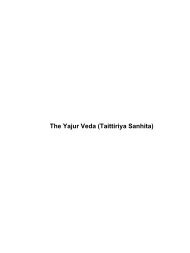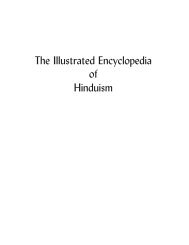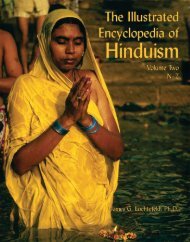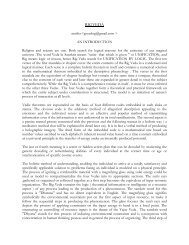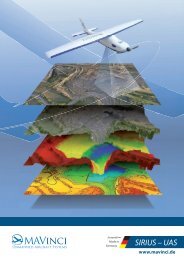A Concise Encyclopedia of Hinduism Klaus K Klostermaie
You also want an ePaper? Increase the reach of your titles
YUMPU automatically turns print PDFs into web optimized ePapers that Google loves.
Tantra 182<br />
Tantra (2)<br />
A form <strong>of</strong> <strong>Hinduism</strong> in which ÿakti, the<br />
energy <strong>of</strong> Ÿiva, is worshipped. ‘Righthand’<br />
Tantra (daksinäcära) is a form <strong>of</strong><br />
Goddess worship similar to that <strong>of</strong><br />
Vi•æu. ‘Left-hand’ Tantra (vämäcära)<br />
involves the worshippers in secret rituals<br />
that are characterized as pañcamakäras<br />
(the ‘5 ms’), namely madya<br />
(intoxicating drinks), mäƒsa (meat),<br />
matsya (fish), mudrä (parched grain and<br />
gestures), and maithuna (extramarital<br />
sexual intercourse).<br />
Tantra-värttika<br />
A subcommentary by KUMÄRILA<br />
BHAfifiA on part <strong>of</strong> the Ÿäbarabhä•ya.<br />
tapas (‘heat’)<br />
Self-mortification. This is an important<br />
notion in <strong>Hinduism</strong> from the earliest<br />
times to the present. According to widespread<br />
belief, self-mortification leads to<br />
an accumulation <strong>of</strong> power which can be<br />
used to summon the gods to be <strong>of</strong> service.<br />
Many stories in the epics and<br />
Puräæas tell <strong>of</strong> attempts by Indra and<br />
other gods to prevent ascetics from accumulating<br />
too much power through tapas,<br />
by either having them seduced or provoked<br />
to anger, through which all power<br />
was annihilated. Hindu scriptures enumerate<br />
a great variety <strong>of</strong> forms <strong>of</strong> tapas:<br />
besides fasting or not lying down to<br />
sleep, they recommend standing in water<br />
up to the neck, holding one arm up high,<br />
looking into the sun etc. One <strong>of</strong> the most<br />
celebrated forms is the ‘five-fire’ tapas:<br />
an ascetic is to build four blazing cowdung<br />
fires, in each direction <strong>of</strong> the compass.<br />
With the midday sun overhead (as<br />
a fifth fire) he is to spend some time<br />
exposed to the heat <strong>of</strong> all these fires.<br />
Tapo-loka<br />
The second-highest <strong>of</strong> the worlds in the<br />
Hindu universe, below Satyaloka (see<br />
BRAHMÄ-LOKA).<br />
Tärä (‘star’)<br />
The wife <strong>of</strong> BØHASPATI. She was abducted<br />
by Soma, the moon, and recovered<br />
by Brahmä. She was delivered <strong>of</strong> a child,<br />
fathered by Soma, whom she called<br />
Budha (Mercury).<br />
tarka-ÿästra<br />
(‘the science <strong>of</strong> reasoning’)<br />
Formal logic, part <strong>of</strong> NYÄYA.<br />
Tarka-bhä•a<br />
See KEŸAVA MIŸRA.<br />
tarpaæa<br />
Libation, the sprinkling <strong>of</strong> water as part<br />
<strong>of</strong> certain rituals, especially connected<br />
with the commemoration <strong>of</strong> ancestors.<br />
tat tvam asi (‘that you are’)<br />
One <strong>of</strong> the MAHÄVÄKYAS (from the<br />
Chäæõogya Upani•ad) teaching the<br />
unity <strong>of</strong> self (tvam) and absolute (tat).<br />
tattva<br />
(‘principle’, ‘element’, ‘that-ness’)<br />
True or essential nature.<br />
Tattva-cintä-maæi<br />
A celebrated work by GA¢GEŸA, considered<br />
the basic text <strong>of</strong> Navya NYÄYA,<br />
dealing with the PRAMÄŒAS.<br />
tattva-jñäna (‘knowledge <strong>of</strong><br />
principles, or <strong>of</strong> truth’)<br />
Metaphysics.<br />
Telang, Käÿïnäth Trimbak<br />
(1850–93)<br />
Pr<strong>of</strong>essor <strong>of</strong> law at Bombay University<br />
and notable Sanskrit scholar, as well as<br />
social reformer, editor <strong>of</strong> Bhartøhari’s<br />
Nïti-ÿätaka and Vairägya-ÿätaka and<br />
Viÿakhadatta’s Mudrä-räk•asa. He<br />
wrote important essays on the




